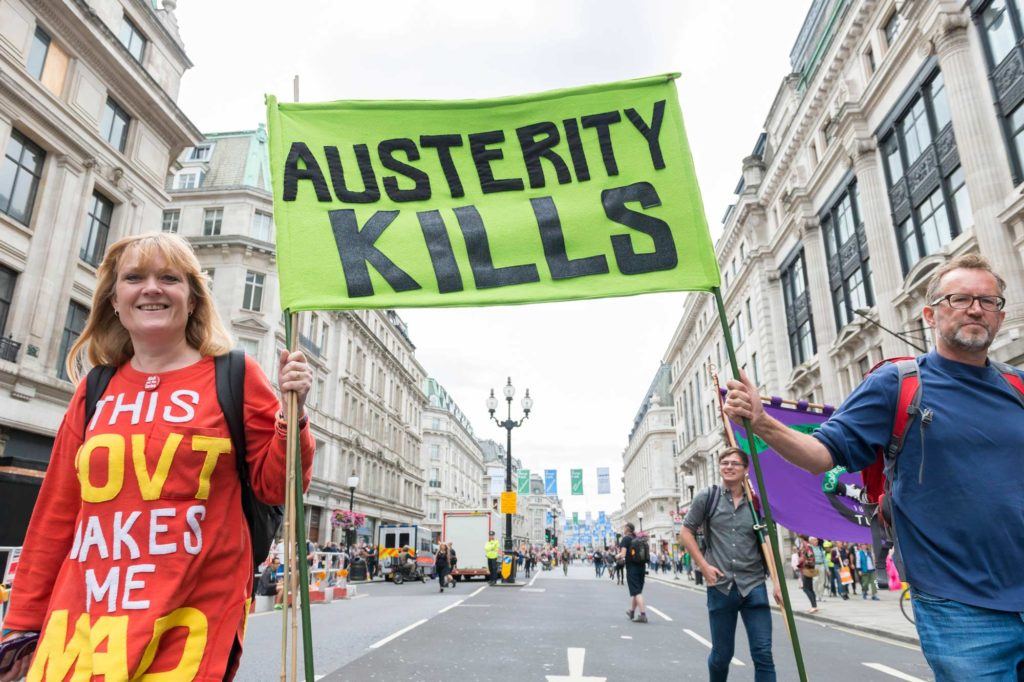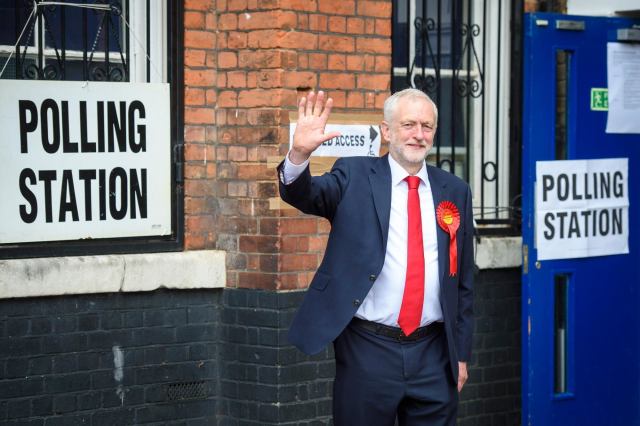Matt Crossick/Matt Crossick/Empics Entertainment
“The Tories are in retreat, austerity is in retreat, the economic arguments of austerity are in retreat”.[1. ‘Jeremy Corbyn: Conservatives and austerity are ‘in retreat’’, Sky News, 1 July 2017]
Or so said Jeremy Corbyn, Labour’s hard-Left leader, when he addressed an anti-austerity march in London last month. Setting aside the fact that Labour’s higher tax, higher spend platform did not prevail, there does appear to be a growing sense that the country has had enough. Indeed, the latest British Social Attitudes (BSA) survey found almost half of respondents do support an increase both in taxes and spending, up from less than a third in 2010.[2. ‘Role of Government’, British Social Attitudes 34, NatCen Social Research, June 2017]
The problem, however, is that interpreting the general election result – when the Conservatives lost their overall majority – as a backlash against austerity is to over simplify. It’s a one-dimensional view that misses the depth of the social and economic turmoil engulfing Britain.
Which is not to minimise the anger felt by those who bore the brunt of the cuts, notably the poorest, and certainly the young and working-age. It is important to recognise that the salami-slicing of budgets that constituted the bulk of the savings were not evenly felt. But it is also important to recognise that overall, the British people have been stoic in their acceptance of the need for the country to live within its means. The British people are not economically illiterate, which explains why, between May 2011 and May 2015, the proportion of people agreeing cuts were “necessary” stayed pretty stable at just below 60%.[3. ‘Government cuts’, Political Tracker, YouGov, 10 March 2017] Indeed, former Prime Minister David Cameron won a surprise majority in the 2015 general election having made the deficit a key campaign plank. And some political observers have pointed out that the Conservative party’s failure to make the case for fiscal responsibility during the 2017 campaign likely contributed to their poor showing. As The Spectator’s James Forsyth put it:
“With the Tories taking the deficit off the table as an issue, they had no response to Jeremy Corbyn’s promise to spend more on pretty much everything. The economy is the Tories’ strongest card, yet it was not played in this campaign. An inexplicable act of negligence.”[4. James Forsyth, ‘Theresa May has no one else to blame for this chaos’, The Spectator, 10 June 2017]
Which is not, of course, to say that people are not fed-up. 2016 did see a decline in support for austerity. Although more people still saw spending cuts as necessary than unnecessary, according to YouGov, the differential had narrowed.[5. Will Dahlgreen, ‘Approval of Government cuts at lowest level for years’, YouGov, 16 March 201] It is interesting, however, that 2016 also saw the lowest proportion of people saying the cuts were impacting their lives (42% versus 65% in 2011). Perhaps if the Conservatives had renewed the case for fiscal discipline, while also presenting a positive vision of the future, the electorate would have been more supportive. They didn’t, and the election result undoubtedly reflected a desire for change.

Austerity has become a lightning-rod for people’s frustrations, but it’s a small part of the cause
Blaming cuts for people’s disaffection allows politicians to ignore the more fundamental issue: the failure of successive governments to grasp the deep fracturing of opportunity and hope for the future. The roots of people’s frustration can be seen well before the financial crash forced a decade of spending restraint (although that restraint has exacerbated problems).
- Home ownership among young people has been declining for almost two decades, while private rents have been increasing.[6. Cassie Barton, Home ownership & renting: demographics, Briefing Paper, House of Commons Library, 9 June 2017] And successive governments have failed to build.
- Low pay and stagnating wages were impacting the living standards of low- and middle-income earners years before the crash.[7. Adam Corlett and Stephen Clarke, Living standards 2017. The past, present and possible future of UK incomes, Resolution Foundation, February 2017]
- High levels of mental illness didn’t appear overnight in 2008, and nor was that the point at which mental health support become a Cinderella service.
- The social bonds between families and communities have been fracturing for decades.
- And the attainment gap at age 16 between poorer children and their wealthier peers has not improved in two decades (though school spending increased by 50% in real terms between 1997 and 2014).[8. Time For Change: An Assessment of Government Policies on Social Mobility 1997-2017, Social Mobility Commission, June 2017]
These issues have a profound impact on people’s wellbeing, yet serious policies to deal with them remain elusive. It is easier to blame austerity, which both Left and Right now seem to be doing. Yet stopping, or even reversing, spending cuts is not going to magically change these outcomes.
In fact, while the financial crash clearly damaged the lives of many ordinary people, and understandably generated a level of anger still felt today, it’s worth considering where we would be had it not happened. My guess is not that far from where we are today, but with a more simmering discontent. Our current model of crony capitalism would still be delivering only for a few (and all too often an undeserving few). We would still be searching for a positive vision of Britain in which prosperity was shared by all. Wages and social mobility would still be stagnating. In short, we would still be in need of radical reform to improve the lives of those left behind.
Government must focus on what matters to people, and that isn’t the latest GDP forecast
Which brings us back to the bigger lesson from the UK’s election upset – unhappy people don’t vote for the status quo – as is being seen across Western democracies. As the Centre for Economic Performance has found, the share of the vote received by incumbent parties is impacted by people’s sense of wellbeing.[9. George Ward, Is Happiness a Predictor of Election Results?, Centre for Economic Performance, April 2015] And that, as Richard Easterlin’s happiness-income paradox has shown, is about much more than money.[10. Richard Easterlin, Laura Angelescu McVey, Malgorzata Switek, Onnicha Sawangfa and Jacqueline Smith Zweig, The happiness-income paradox revisited, PNAS, 26 October 2010]
There is now strong evidence that, for example, social capital – the quality of an individual’s relationships with their friends, family and neighbours – is more important than money in determining their happiness;[11. John Helliwell and Robert Putnam, The social context of well-being, 31 August 2004] that poor mental health is one of the biggest causes of misery – far more so than income level;[12. ‘The causes and effects of wellbeing’, Centre for Economic Performance, accessed 16 August 2017] and that the negative impact of unemployment on wellbeing goes well beyond what can be explained by a loss of earnings.[13. John Helliwell and Robert Putnam, The social context of well-being, 31 August 2004]
So while politicians and the commentariat obsess over the latest quarterly GDP statistics, ordinary people are worrying about whether their job is secure, whether their family is safe and well, whether their children’s generation will be richer, healthier and safer than theirs (YouGov polling for UnHerd found fewer than one in five Britons believe this will be the case).
People are judging their governments not on a narrow view of austerity, but on how satisfied they feel with their lives – and across the West government is being found wanting. “This”, as Scottish Conservative leader Ruth Davidson wrote for UnHerd, “is what market failure piled upon social failure piled upon political failure looks like”. Abandoning austerity won’t change that, because austerity didn’t cause it. It’s time UK politicians turned their attention to the twice yearly national wellbeing measures.









Join the discussion
Join like minded readers that support our journalism by becoming a paid subscriber
To join the discussion in the comments, become a paid subscriber.
Join like minded readers that support our journalism, read unlimited articles and enjoy other subscriber-only benefits.
Subscribe